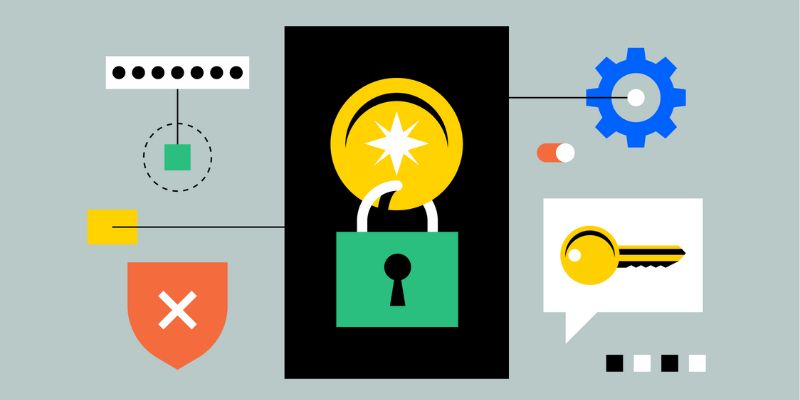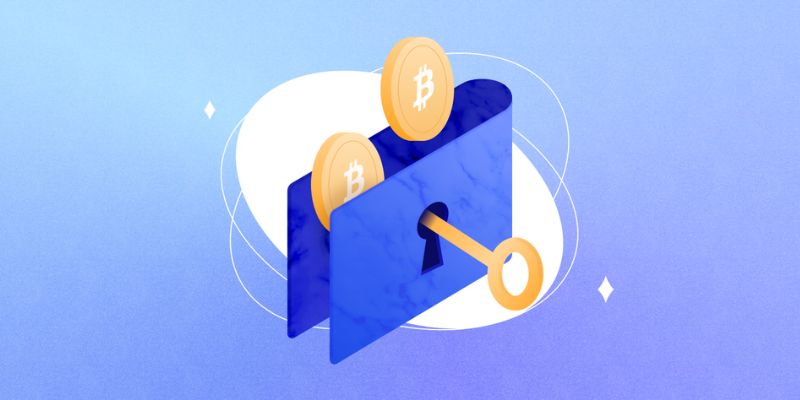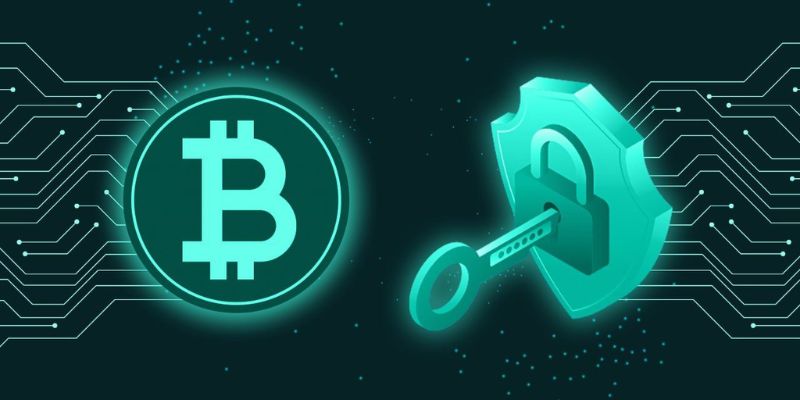How to keep your crypto safe isn’t just a catchphrase; it’s a necessity in the buzzing world of digital currency. Your journey to building iron-clad security starts with unpacking the essentials. From setting up two-factor authentication to recognizing phishing scams, these pages are your road map. You’ll learn the best steps to protect your digital gold, and I’ll guide you through enhancing wallet security, safe blockchain navigation, upping the ante with advanced protections, and managing risks like a pro. Get ready to shield your crypto with these 5 essential tactics.
Understanding the Basics of Crypto Security
The Importance of Securing Digital Currency
Keeping crypto safe is like locking a treasure chest. If you leave it open, anyone can take your treasure. So, you make sure it’s locked tight.
Best Practices for Crypto Security
Let’s dive into the nuts and bolts of crypto safety. Protecting private keys is your first job. Think of these keys as the secret codes to your treasure. Lose them, and you might lose your crypto forever.
Two-factor authentication on your crypto account is a big yes. It’s like having a guard double-check who’s entering your treasure room. For this, you’ll need something you know, like a password, and something you have, like a phone.
Then there’s the multi-signature wallets. Imagine a lock that needs two keys to open. It means more than one person must okay a transaction. That way, if someone gets one key, they still can’t reach your crypto.
Do you keep your crypto online, where hackers lurk? That’s where cold storage for cryptocurrency comes in. Think of it like burying your treasure on a deserted island. It’s offline, so it’s super safe.
But what about when you’re trading? A secure internet connection is a must. Public Wi-Fi is a no-go. It’s like leaving your treasure map out for everyone to see.
Always update security regularly. Hackers don’t rest, and neither should your defenses. Imagine constantly building higher walls around your treasure.
Encrypting crypto assets is like creating a secret language for your valuables. Even if someone finds them, they can’t understand them without the key.
And remember, backing up your wallet is like making a copy of your treasure map. One is good, two is better. You’ll thank yourself if the first one gets lost.
Blockchain security measures are your watchtowers. They keep an eye out for shady characters trying to mess with your crypto.
What about hardware wallet advantages? They are like carrying a small safe around that no one else can open. They keep your crypto locked away and portable.
Lastly, we have paper wallet security. It’s a physical copy of your keys. Simple, but powerful. Just keep it somewhere safe, like you would a precious family photo.
In all of this, remember one thing: The best cryptocurrency security tips always evolve. So stay sharp, update often, and keep learning. Just like your crypto, your knowledge should keep growing.
Enhancing Wallet Security and Recovery
Implementing Two-Factor Authentication and Multi-Signature Wallets
How can you toss an extra lock on your crypto wallet? Yup, you got it – two-factor authentication (2FA). It adds another step to your login. Think of it as a sturdy, high tech fence around your digital gold.
Now, what’s the deal with multi-signature wallets? Simply put, they need more than one key to open. Like a bank vault that needs two managers to unlock, multi-sig wallets use several keys. This means better security and no single point of failure.
Here are some top cryptocurrency security tips. With 2FA, even if someone gets your password, they’re stuck at the gate without that second key. For multi-sig, if a bad actor grabs one key, they can’t do much. You’re still holding the other keys!
This keeps your coins safer than a dragon’s hoard. Always set up 2FA when possible. And for big savings, think multi-sig. They’re like having trusted friends each hold a key to your treasure chest.
Cold Storage Solutions and Backup Strategies for Crypto Wallets
Ever heard of ‘cold storage’ for your digital dough? It’s like a safe buried in a mountain. Cold storage means keeping your crypto offline, away from thieves. When you’re not trading, keep your assets in cold storage. It’s your own Fort Knox.
But guess what’s crucial? Backing up your wallet. Just like you save family photos in a safe place, you need backups for your crypto. Write down your keys and store them like a secret map to your buried treasure.
Remember, if you lose that map, or your keys, your treasure might as well be lost at sea. Have copies in different spots. Some folks even use metal to etch their keys. It won’t burn, and it lasts longer than paper.
Be smart and stay on top of these crypto wallet protection strategies. Keep regular backups. Use safe spots for them. This way, you’re ready for whatever comes. It’s like having a life vest on a ship. It just makes good sense.
So, pals, remember these best practices for crypto security. The world of crypto can be rough, but with these tips, you’ll be sailing safer seas. Protect your keys, use 2FA, go for multi-sig wallets, and keep your treasure in cold storage with good backups. You’ll be a wise captain in the world of cryptocurrency.
Navigating the Blockchain Safely
Regularly Updating Security Measures and Recognizing Phishing Scams
To keep your crypto safe, always update security. I mean it. Hackers grow smarter daily. You must stay a step ahead. Think of your crypto like treasure. You wouldn’t leave treasure unguarded, right? So, update your defenses often. It’s a key cryptocurrency security tip.
But how often should you update your security? Think monthly, or after any breach news. Fresh updates patch holes that hackers could slip through. It’s like fixing your fence so thieves can’t sneak in.
Now, let’s tackle phishing scams. These bad emails pretend to be from a legit source. They trick you into giving your keys to the crypto kingdom. What’s the best way to spot them? Check for weird links or urgent requests for info. Also, ask yourself, “Does this seem odd?” If yes, it’s a no-go.
Be careful! Don’t click links from strangers. That’s securing digital currency 101. Always go to the official site yourself. Don’t follow paths a possible scammer paves.
Decentralized Finance Security and Using Hardware Wallets
Decentralized finance (DeFi) is a wild new world. It comes with big wins but huge risks. To use DeFi wisely, first, grasp the security needs. Always check where you put your crypto. It’s like knowing who handles your money.
What about hardware wallets? They’re a must-have. They’re small devices that store your crypto keys safely offline. This makes them hard to hack. They’re the safe in your crypto home.
Using hardware wallets is smart. But cold storage for cryptocurrency is even cooler. Face it—you can’t hack what’s not there. Offline, your crypto sleeps untouched by online threats. Secure and snug.
The line? Regular check-ups for your wallet’s health. Use hardware wallets like an armored truck for your digital cash. DeFi can be good, but only when you’re safe. Remember, my friend, in crypto, a little caution goes a long way.
Advanced Protection and Risk Management
Self-Custody vs. Crypto Custodian Services: Ensuring Asset Safety
Keeping your crypto safe means understanding your storage options. Self-custody means you control your private keys. These keys are like the secret codes to your crypto. If someone else gets them, they can take your coins. That’s why holding them yourself is a big deal. It gives you full control and responsibility.
Yet, it can feel scary to manage this alone. That’s where crypto custodian services come in. These are banks or companies that look after your keys for you. They’re like a safe place where you can keep your digital coins. But remember, with custodians, you trust another party with your assets. Choose wisely and check if they are safe and follow strong security measures.
Adopting Anti-Malware Measures and Strategies Against Crypto-Jacking
Malware is nasty software that tries to harm your computer and steal data. It’s a real threat in the crypto world. Crypto-jacking is when hackers use your computer to mine cryptocurrencies without you knowing. They steal your computer’s power and it can slow down your device a lot.
To fight this, you need good habits and tools. First, always keep your computer and phone updated with the latest security patches. Hackers love old software because it’s easier to attack. Second, use anti-malware software that’s made for crypto investors. This type of software is designed to protect against threats specific to cryptocurrencies.
Next, be smart about what you click and download. Phishing scams can trick you into installing malware. They can look like real websites or emails from someone you know. Always double-check before you click.
Keep an eye out for any signs of crypto-jacking, like your device being slow or overheating. If you notice something’s off, check for unknown processes in your task manager. And finally, use a secure internet connection when trading. Public Wi-Fi can be dangerous because it’s easier for hackers to get into your device.
By taking these steps and using common sense, you can guard against these digital thieves. Keep your crypto safe and sound. Remember, in the crypto world, being your own guard is the key to keeping your treasure secure.
In this post, we’ve covered the key steps to keep your crypto safe. Starting from securing your digital cash to advanced protection tactics, we understand how important it is. Use strong passwords and lock down your wallet with two-step verification and multi-signature tech. Keep most of your funds in cold storage and make backup plans. Stay sharp online. Know the tricks scammers use and keep your security stuff up to date. Think about using hardware wallets for extra safety. Choose between self-keeping your coins or using a crypto custody service. Always guard against malware and crypto-jacking. Remember, staying safe with crypto means staying smart and alert. Keep your guards up and your investments safer. It’s all about smart moves for your digital coin safety.
Q&A :
How can you ensure the security of your cryptocurrency assets?
Securing your cryptocurrency is crucial to safeguarding your investment from theft and unauthorized access. You can enhance the security of your crypto assets by using hardware wallets, which store your private keys offline. Additionally, enabling two-factor authentication (2FA) on all your accounts, using strong and unique passwords, and keeping your software up to date can prevent potential breaches. It’s also important to be vigilant against phishing scams and to avoid sharing your private keys or seed phrases with anyone.
What are the best practices for storing cryptocurrencies safely?
To store cryptocurrencies safely, it’s important to use a combination of hot and cold storage solutions. Hot wallets are connected to the internet and are suitable for smaller amounts of crypto that you might use day-to-day. For larger, long-term holdings, cold storage options like hardware wallets or paper wallets are preferred because they are not connected to the internet and are less vulnerable to hacking. Regularly backing up your wallet, using secure and encrypted connections, and maintaining the confidentiality of your recovery phrases are also key best practices.
Is it necessary to use a hardware wallet to protect your crypto?
While it isn’t strictly necessary to use a hardware wallet to protect your crypto, it is highly recommended, especially for significant amounts of cryptocurrency. Hardware wallets are one of the most secure ways of storing crypto because they keep private keys entirely offline, making them immune to online hacking attempts. If you are holding crypto as a long-term investment or have a considerable amount, investing in a hardware wallet would provide an added layer of security.
How can you recover your cryptocurrency if you lose access to your wallet?
Recovering cryptocurrency after losing access to your wallet depends on the type of wallet and the security features you have in place. For most wallets, you can regain access by using your recovery phrase or seed phrase, which is a series of words generated when you first set up the wallet. It’s crucial to store this phrase securely and offline, as it can restore your wallet and funds on a new device. If you have lost your recovery phrase, you may permanently lose access to your crypto assets, thereby highlighting the importance of keeping it safe.
What should you do if you suspect your crypto wallet has been compromised?
If you suspect that your crypto wallet has been compromised, act immediately to secure your assets. First, transfer your funds to a new wallet with a new private key to prevent any unauthorized transactions. Change all related passwords and review your recent transactions to check for any unauthorized activity. It’s also wise to contact customer support for your wallet provider or exchange for further assistance. Implementing additional security measures and staying vigilant for any signs of further suspicious activity is critical in preventing future compromises.





